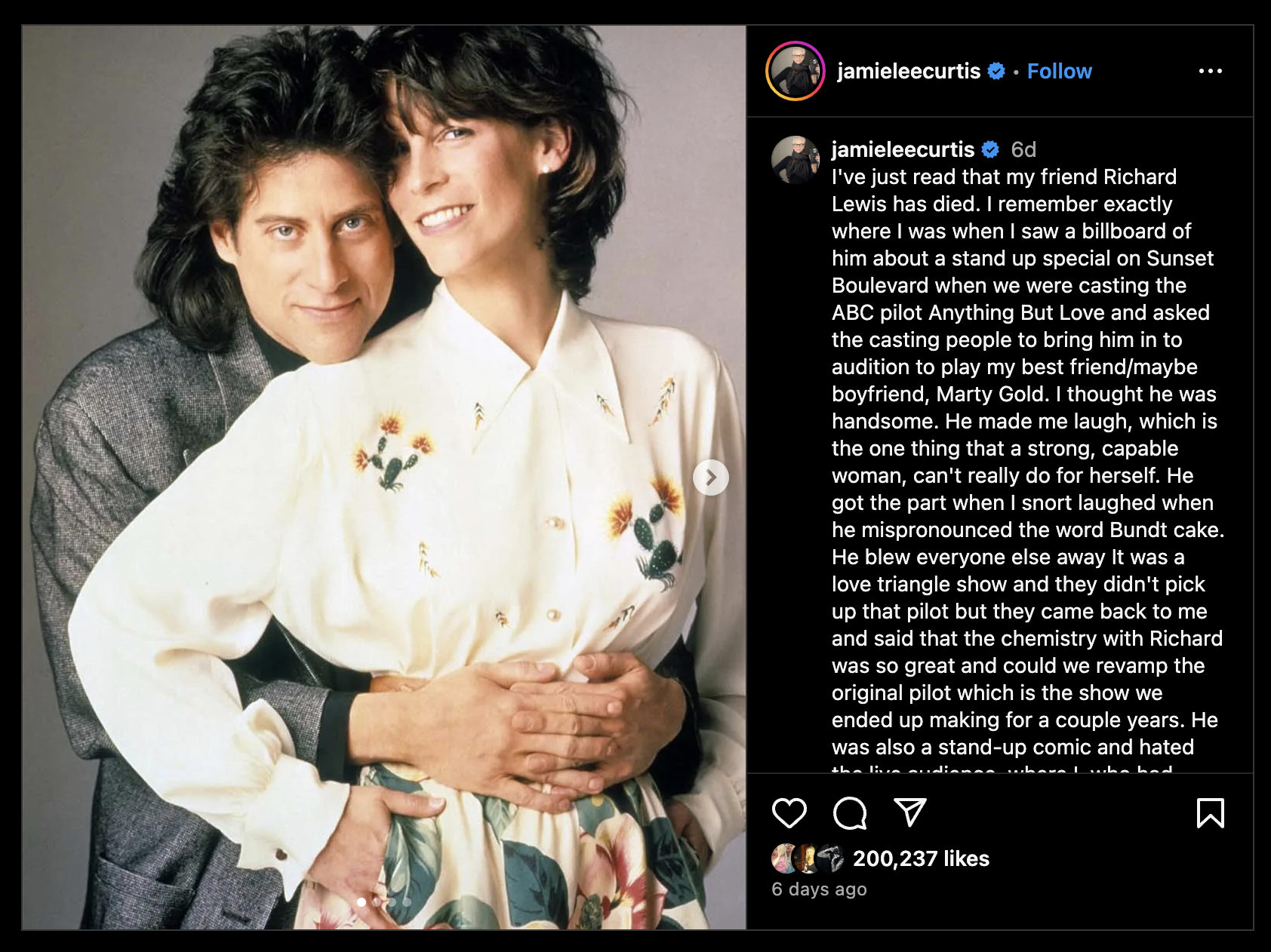From Shadows to Light: The Enduring Legacy of Richard Lewis
In the bizzaro, made-for-tv carnival that is life, comedian Richard Lewis danced across the highwire with the grace of a hyper-caffeinated ballet dancer, his big, beautiful soul as black as his trademark stage garb. Both onstage and off, Lewis slayed his demons with a rapier wit sharp enough to slice through the hull of a battleship. His passing on February 27, 2024, by way of a heart attack at the tender age of 76 (in 2023 he revealed a Parkinson’s diagnosis), instantly sent ripples through the fabric of the comedic world and far beyond, into the dark, turbulent waters of those battling the multi-headed hydra of addiction.
Lewis was not merely a comedian; he was a sorcerer of the psyche, delving into the abyss of his own madness with a swaggering fearlessness, deftly patrolling the perimeter of sanity with one hand pushing through his thick brown mane and a cocked-eye smile. His comedy, a frantic, stream-of-consciousness assault on the sensibilities, left audiences gasping for air between gales of laughter, even as they recognized pieces of their own shattered consciousness in his words. Yet, beneath the chaos and the laughter lay a man fighting a battle that was all too real, a man who once found himself staring into the void and who chose to treat the void the way that a dog treats a fire hydrant.
On August 3, 1994, Lewis — his mind in tatters and his body ravaged by years of alcohol abuse — found himself literally hours from death. The next day, he was rushed to the ER where doctors saved his life. He didn’t drink that day, instead, he made a decision. It would be Day 1 of his new life, a fantastic, twenty-nine year rebirth in the world of recovery.
Nicknamed the "Prince of Pain," Lewis was a titan striding the earth, hurling thunderbolts of wisdom and salvation to those lost in the same darkness that once threatened to consume him. In the wake of his passing, accolades poured in, painting a portrait of a man who wielded his humor like a scalpel, dissecting his own flaws with precision while offering up his discoveries as a map for others to follow out of their personal hells.
Jamie Lee Curtis, in a series of heart-wrenching Instagram posts, laid bare the depth of Lewis's impact, not just on her life but on the lives of all those touched by his relentless advocacy for sobriety. His was not a passive journey; it was a crusade, a holy war against the specter of addiction, fought in the trenches, one desperate soul at a time. His legacy, she stated, is not in the laughter he left behind, but in the healing he fostered, a testament to the power of recovery and the unbreakable bonds of fellowship and solidarity among those who have found a solution.
In another post, Curtis wrote, “Richard Lewis helped people laugh and he helped people heal through his tireless, indefatigable belief in sobriety,. The laughs may stop but the healing never does. It's the power of recovery and fellowship and solidarity and it's available everywhere all at once. A phone call away. Rest in the knowledge that you helped people, Richard. First of all, me.”
Andy Lassner, a producer of The Ellen DeGeneres Show, recalled meeting Lewis at a 12 step meeting and receiving daily calls from Lewis while Lassner had dropped out of recovery, into a dark period of relapse. Undaunted, Lewis threw on his jacket. “I remember was a knock on the door, and there stood Richard,” Lassner wrote. “He told me to get my stuff. I did. He then took me to his house.” Lewis looked after Lassner until he could get his friend into rehab, where he finally found longterm sobriety. “He was one of the many angels in my life who saved me,” Lassner wrote. “He was the menschiest of mensches.”
Lewis himself, in celebrating his sobriety milestones, did so with hope and humility. His message was clear: "If you’re struggling you can get help. I did." This wasn't the boast of a man who had conquered his demons; it was the rallying cry of a warrior still in the fight, a beacon for those still lost in the shadows.
In his passing, Richard Lewis leaves a void in the world of comedy that can never be filled. Yet, his greatest contribution may well lie in the lives he touched, the souls he saved and the message of hope that he left behind. In a world increasingly devoid of heroes, Lewis emerged as a blinding ray of hope, a reminder to those lost in throes of alcoholism and addiction that, no matter how dark the night, dawn is always on the horizon. Happily trudging his road to redemption, Lewis took the pain and absurdity of life and turned it into grace. In the end, Richard Lewis didn’t just make us laugh; he showed us how to live.



